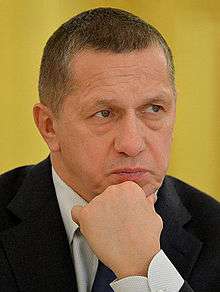Yury Trutnev
| Yury Petrovich Trutnev Юрий Петрович Трутнев | |
|---|---|
 | |
| Deputy Prime Minister of Russia and Presidential Envoy to the Far Eastern Federal District | |
|
In office August 31, 2013 – present | |
| Preceded by | Viktor Ishayev |
| Assistant to the President of Russia | |
|
In office May 22, 2012 – August 31, 2013 | |
| 2nd Minister of Natural Resources and Ecology of Russia | |
|
In office March 9, 2004 – May 21, 2012 | |
| Preceded by | Vitaly Artyukhov |
| Succeeded by | Sergey Donskoy |
| 3rd Governor of Perm Oblast | |
|
In office December 17, 2000 – March 11, 2004 | |
| Preceded by | Gennady Igumnov |
| Succeeded by | Oleg Chirkunov |
| 1st Mayor of Perm | |
|
In office December 9, 1996 – December 17, 2000 | |
| Preceded by | Vladimir Fil |
| Succeeded by | Arkady Kamenev |
| Personal details | |
| Born |
March 1, 1956 Perm, Perm Oblast, Russian SFSR, Soviet Union |
| Nationality | Russian |
Yury Petrovich Trutnev (Russian: Ю́рий Петро́вич Тру́тнев; born March 1, 1956) is a Russian politician. From 2004 to 2012, he was Minister of Natural Resources and the Environment of the Russian Federation. From 2012 to 2013 he was Assistant to the President of Russia. On August 31, 2013, he was named Deputy Prime Minister of Russia and Presidential Envoy to the Far Eastern Federal District. Holds a 5th dan in Kyokushin Karate.
Local government
He was chosen mayor of the city of Perm in 1996 (achieving 61.42% support in the first round) and elected governor of the Perm region in 2000 (51.48%).
Federal government
During his time as a governor he maintained a neutral stance towards the Kremlin administration. Trutnev's hobbies include rally racing and karate.
In 2008 and 2009, Trutnev was officially Russia's best earning government member. In April 2010, he reported an overall income of 155 million rubles ($5.34 million) for the past fiscal year, according to figures published by the government.[1] President Dmitry Medvedev in 2008 obliged all government officials to publish their incomes and assets, in his drive to fight rampant corruption. However the figures do not explain how money was earned.[2]
Defending seals
Russia made headlines worldwide when, on March 18, 2010, it announced that it would ban the killing of seals less than a year old,[3] effectively ending one of the biggest kills of harp seals in the world. Yury Trutnev called the seal slaughter "bloody", and remarked that the killing of defenseless animals can't be deemed a "hunt".[4]
References
- ↑ (Russian) Income declarations of Russian government officials for 2009 Archived April 15, 2010, at the Wayback Machine.. Published April 12, 2010
- ↑ Article in the Moscow Times
- ↑ "Russia bans hunting of baby harp seals", Guardian news article
- ↑ International Fund for Animal Welfare Press Release
External links
- (Russian) Official site